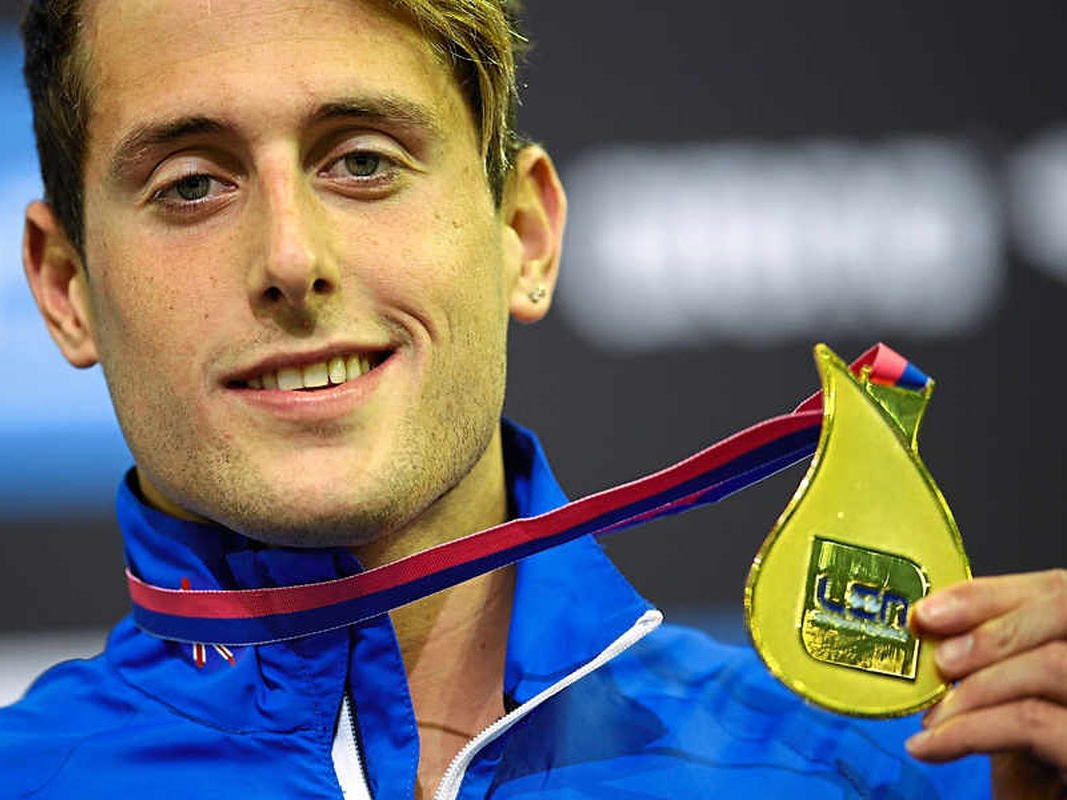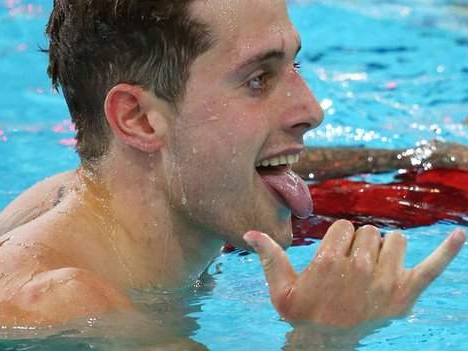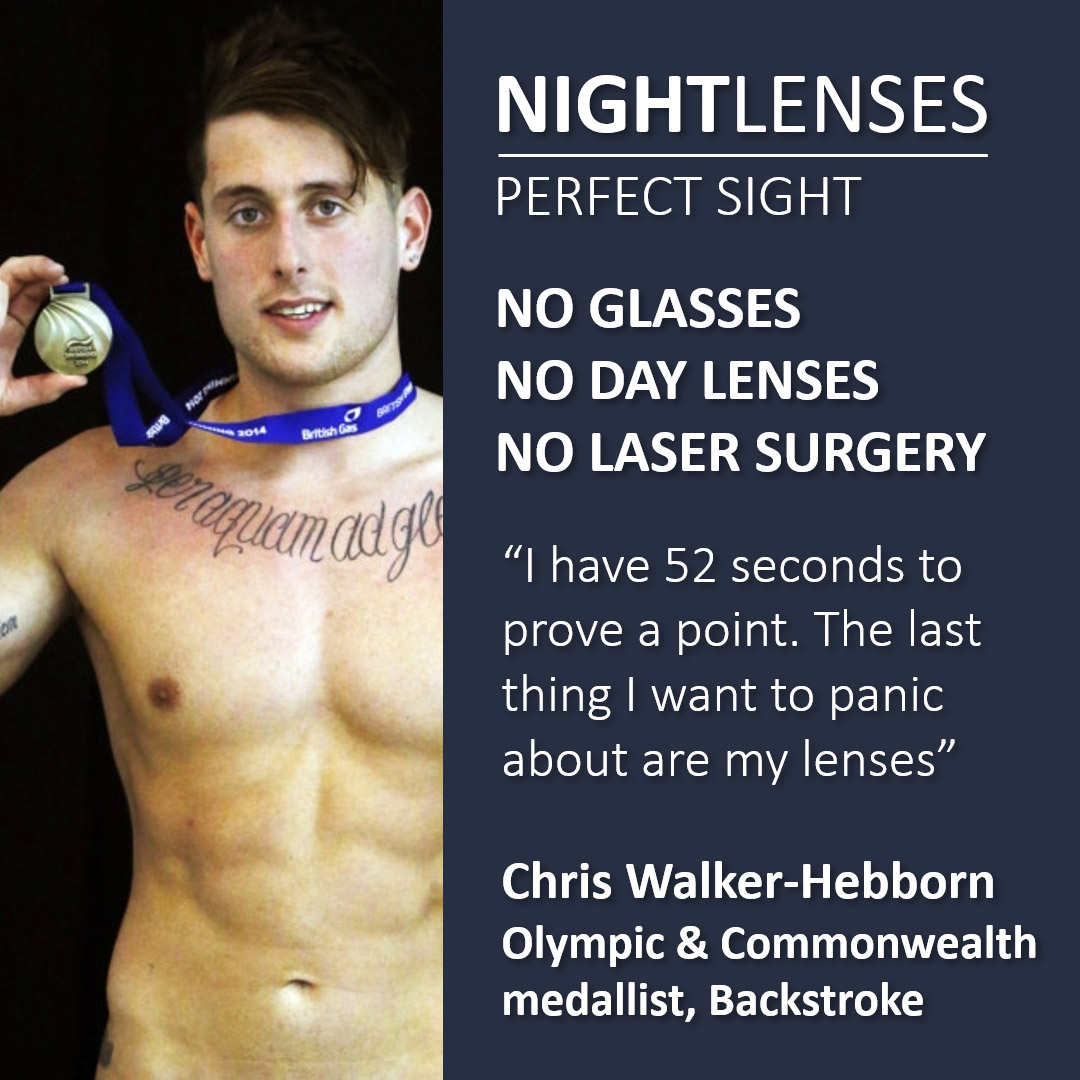Chris Walker-Hebborn

Night lenses changed my life | Chris Walker-Hebborn | Olympic swimmer
Q: I’m really looking forward to this chat with Chris. Chris was the 100m backstroke gold medalist at the 2014 Commonwealth Games and won a silver medal as part of the Medley team at the 2016 Olympics. I remember watching the Olympics race, which was iconic as it marked Phelps’ last Olympic race, unfortunately pushing Chris and his team into second place. So, let’s start by asking you about that race, Chris. It was Phelps’ last race, but you had a strong team – what was the atmosphere like?
A: It was absolutely incredible. It was the last race of the meet, and the stadium was packed. We knew it was going to be a big one, and the energy was electric. It’s hard to put into words. The race was extremely tough, and they managed to edge us into second place.
Q: You’ve had some standout moments in your career, with the Commonwealth gold being one of them. Can you tell us about that race?
A: People often ask me about my favorite memory, and it has to be 2014. It was my first gold medal. Although I had a successful junior career, breaking through in the senior ranks was a challenge. Winning a couple of gold medals in 2014, along with a record that still stands today, is something I’m immensely proud of. Even though the Olympic silver was great, it was still second place!
Q: It’s interesting to look back at that race. The commentator didn’t expect you to come through, but you did. How did you feel about that?
A: The commentators, whether it was Helen Skelton, Steve Parrish, or Sharon Davis, have followed my career closely. You build a rapport with them over the years, whether you’re having a good or bad season. I remember talking to Sharon Davis afterward, and she said, ‘finally!’ I replied, “tell me about it!” After that, things continued to improve. Having the best years of my career toward the end is a testament to never giving up.
Q: When did you first start swimming?
A: I started swimming at a young age because my parents believed it was an essential life skill. I was involved in various sports, but swimming turned out to be my forte. For those familiar with swimming, it consumes a lot of time for relatively little actual racing. When I was 15, I made it to the nationals. They used to select six boys each year for a two-year scholarship program in Australia called the Offshore Program. At the time, I wasn’t even close to being in the top six, but many of the lads didn’t want to leave home at such a young age. My mum encouraged me to seize the opportunity. So, I spent two years in Australia, during which I became the European Junior Champ and World Junior Champ, seemingly out of nowhere.
Q: Let’s discuss night lenses, which leads us to your eyesight. When you were 15 or 16, did you notice your eyesight deteriorating, and did it affect you?
A: I was always aware that my eyesight wasn’t great, but I resisted wearing glasses and got used to having poor vision. I had to squint at times. The breaking point came when I started learning to drive and couldn’t read road signs or number plates. That’s when I realized I needed glasses, but I didn’t like the idea. Of course, swimming with glasses wasn’t an option, so I ended up trying night lenses as a solution.
Q: Did you start with daily contact lenses? Did you ever consider using prescription goggles?
A: Prescription goggles had been available for a while, but they weren’t exactly stylish or attractive. Racing in them wasn’t an option for me, especially considering my concern for appearance, especially when competing on TV. Glasses were also out of the question. So, daily contact lenses seemed to be the only viable option. They were alright for everyday use, but for swimming, as anyone who has swum with contact lenses knows, they can easily fall out, fold, or get stuck under your eyelid. It wasn’t a practical solution. I’d usually insert them just before a race to read the scoreboards and flags, but it wasn’t ideal. Sometimes I’d lose one or end up racing with only one lens in, which was far from ideal.
Q: Many elite athletes emphasize the need for everything to be perfect on the day to achieve gold or victory. Did you encounter any issues with your contact lenses right before or during a race that affected your performance?
A: To perform at my best, I needed a stress-free environment. I had about 52 or 53 seconds to prove myself, and the last thing I wanted to worry about was my lenses. There were a couple of memorable occasions when things went wrong, although luckily not on the world or Olympic stage. I remember one incident in France during an outdoor race, which is always more challenging. I couldn’t get my lenses in before the race, and I was messing around with them, feeling stressed. I was in the final of the 100 backstroke, competing against Camille Lacourt, the reigning world champion at the time, on his home turf. I was looking to compete and hold my own, but eventually, I had to race without my lenses, which wasn’t ideal. I didn’t perform as well as I could have. I refused to look at the scoreboard after the race because I knew I had come second, and I didn’t want people to see me squinting!


A: Fortunately, as a backstroker, we don’t have a lot of velocity coming off the blocks, so I wasn’t prone to goggles sliding down my face or around my neck. However, during the semi-final of the European championships, I came up from a tumble turn, blinked naturally, and one of my lenses folded in my eye. I couldn’t unfold it, but luckily, I made it to the finals and had a successful European championship. These little annoyances with daily lenses and swimming were quite frustrating.
Q: This brings us to night lenses. You put them in at night, take them out in the morning, and enjoy perfect vision without glasses or contact lenses during the day, which is ideal for swimming. Looking back, if you had the option of night lenses when you were 15 or 16, do you think it would have been an obvious choice for you?
A: Night lenses would have certainly made life easier. They’re a game-changer. Wearing glasses was bothersome. It’s inconvenient to rely on something all the time for decent vision. It’s definitely something I would have opted for earlier. Now, I can’t imagine my life without them. I haven’t worn glasses in five or six years, and I have no intention of doing so anytime soon. Night lenses are a fantastic solution.
Q: You’re now an active dad with a busy life. Do you find that night lenses have benefits beyond your sport?
A: Absolutely. Not needing to wear glasses to drive and having clear vision is a great advantage. I’m not saying glasses are bad; they suit some people, but they weren’t for me. When I go to the park with my daughter, being able to distinguish her clearly from other children is a big plus. It’s the little things you don’t appreciate until you make the switch. I’m used to having perfect vision every moment of my life. It’s not something I could go without now. I’ve grown accustomed to it.
Q: Have you ever considered laser surgery?
A: Yes, I thought about it toward the end of my swimming career when training was winding down, and I wanted to retire on my terms. Luckily, I had that luxury. However, I couldn’t undergo laser surgery due to my lazy eye condition. That’s when night lenses were recommended, and now I can’t imagine life without them.
Q: Why would you recommend night lenses to young, talented, short-sighted swimmers out there?
A: It’s definitely something to consider at a younger age. It’s not a regret for me because it wasn’t an option at the time. Night lenses can change the trajectory of your career by eliminating minor worries. As superficial as it may sound, when you’re on the podium for photos, looking at yourself on the screen, or trying to check your time without needing your coach’s input – these little things can make your journey much smoother. The most significant benefit is that my eyesight hasn’t worsened in six years. I’m still using the same prescription from six years ago, and I just get a new set of lenses every year. It couldn’t be simpler.
Q: You mentioned “game changer” earlier, a term often used by athletes when talking about night lenses. They offer an alternative to laser eye surgery, which isn’t a permanent solution and comes with risks and potential side effects. For elite athletes, it means time away from training and competing. Do you believe night lenses could be game changers for short-sighted elite athletes and sportspeople?
A: Absolutely, no doubt about it. They save you from taking time out of the water, and laser eye surgery can be quite invasive. I haven’t heard of anyone who didn’t struggle for at least a week afterward. Many of us, especially in swimming, can’t afford to miss training. Missing just three sessions can label us as unfit or put us out of touch with the water. I know it might sound dramatic, but at that level, it really is that precise. Having a viable, practical option like night lenses, I don’t see how it’s not a game changer. I’m not knocking laser eye surgery, but my best mate’s dad has undergone it three times, and I have no intention of going through all that.
Q: They often say night lenses are optometry’s answer to laser eye surgery. Thank you so much for your time and this interview. It’s been great following your career, and it was fantastic to watch your two epic races again.
A: Thank you.
After we finished the interview, Chris and I were chatting, and I asked him about his race against the French champion. I’ve read several times about how important confidence is, especially projecting it to your competitors. Adam Peaty often talks about arriving at the blocks with the certainty that he has trained harder and is better than everyone else in the race – a confidence that serves him well. Usain Bolt, Phelps, and many other legends arguably won races before they even started based on their reputation and swagger. Chris had an interesting response:
Chris: I guess for me, having poor sight was like Superman’s kryptonite. With glasses on, I felt like Clark Kent – normal, weak, and beatable. Take them off, and I became Superman. When I was younger, I had a certain level of arrogance about my ability, which everyone needs at the top level to deliver a confident, winning performance. I didn’t want to walk into a room with swagger, only to be seen struggling to put in a contact lens to see clearly. It would be a clear sign of weakness. This applies to all elite athletes. To win, you must 100% believe that you’re the best in the room and project that vibe to your competitors. Night lenses meant that I never had to show weakness or vulnerability. They made me feel like Superman! 😊
WATCH | Chris Walker-Hebborn
Watch this interview in full, filmed on Zoom.
